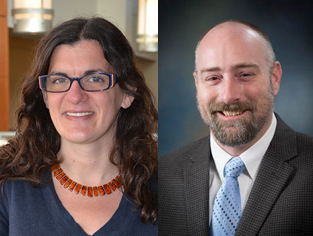Weldon School of Biomedical Engineering embraces accessibility, with help from ITaP

Today, she thinks differently.
“What would I say is the hardest part of implementing accessibility into my course?” asks Calve, an assistant professor of biomedical engineering. “Nothing. There really was no effort on my part. ITaP made it incredibly easy.”
That statements makes Corey Linkel, associate director of undergraduate programs for the Weldon School of Biomedical Engineering, laugh. When he first considered approaching a faculty member with the idea of implementing accessibility measures, he sought out Calve primarily because he knew it would be a hard sell.
“She’s known as being less open to what some perceive as ‘touchy-feely’ student initiatives,” says Linkel. “But I knew if I could convince her, others would be likely to follow.”
This fall the Weldon School of Biomedical Engineering has championed accessibility in many of its courses, through a variety of initiatives that Linkel says are aimed at changing the culture of the department.
“We spend a lot of time talking with students about the ideas of universal design, and accessibility is a part of universal design,” says Linkel. “So, in a sense, we’re really just practicing what we’re teaching.”
To promote accessibility, all of the department’s teaching assistants were shown by ITaP where to get help and how to create accessible Word documents, .pdfs and PowerPoints. In Linkel’s undergraduate class, students were also taught how to create accessible documents and are required to make assignments accessible too.
“The goal is to get students to think about accessibility as part of everything they do,” says Linkel.
For Calve the adoption of accessibility practices for her course meant reviewing course materials and refining small details. She also accepted ITaP’s offer to format one of her course’s materials at no charge – an offer that is available to all faculty members and teaching assistants at all of Purdue’s campuses.
“As an instructor it gave me the opportunity to refine my materials and be a little bit more intentional about how I was putting things together,” says Calve. “I can’t think of a reason that anyone who is teaching wouldn’t want to take advantage of that opportunity.”
Source: Biomedical Engineering embraces accessibility, with help from ITaP
